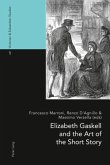Studienarbeit aus dem Jahr 2010 im Fachbereich Anglistik - Literatur, Note: 1,0, Johannes Gutenberg-Universität Mainz (Department of English and Linguistics), Veranstaltung: Proseminar I - The British Novel in the 18th and 19th Centuries, Sprache: Deutsch, Abstract: The condition of the lower classes under the effects of industrialisation is one of the most frequently depicted topics in literary works about nineteenth century England. Elizabeth Gaskell is one of the more prominent novelists who wrote about such conditions by drawing the reader's attention to the social injustices of her time.The increased level of literacy in Victorian England contributed to a mass-market for book publishing and its mass audience was mainly made up of middle-class readers. Their attitude towards the poor, the "Other Nation", was fundamentally that of horror and fear of rebellion, the contagion of diseases, disgust and sometimes even pity. They were able to read about the lower classes from a secure distance and either be admonished of the 'danger' that they represented or share the writer's sympathy. Elizabeth Gaskell was deeply concerned with the social situation of her time and expressed her attitude towards the social system and the neglected by means of her novels. She used her writing as an instrument of social criticism and to express her overt attitude toward the widespread distress. In order to change the indifference of her target audience mentioned above, she employed the figure of a social explorer. To evoke the reader's sympathy through pity, she utilised individuals to represent society. This paper concerns with one of her social explorers: the middle class heroine Margaret Hale who was brought up in the South but is forced to leave her home and move to an industrial town in the North.
Hinweis: Dieser Artikel kann nur an eine deutsche Lieferadresse ausgeliefert werden.
Hinweis: Dieser Artikel kann nur an eine deutsche Lieferadresse ausgeliefert werden.








